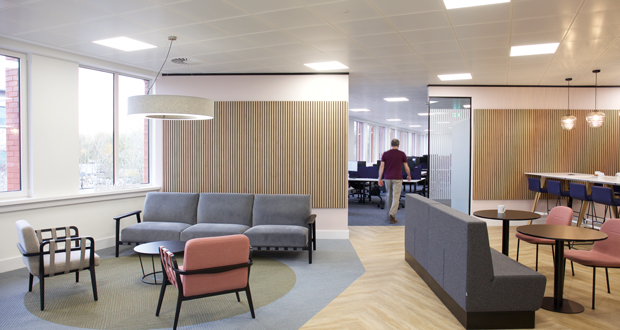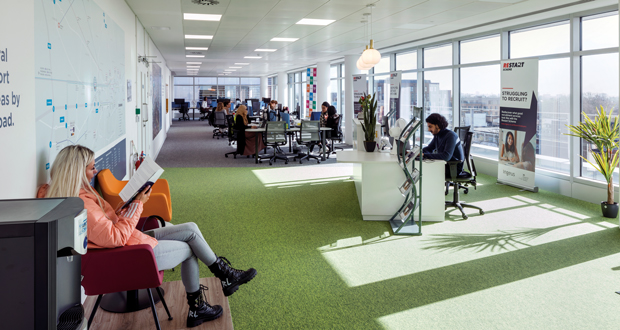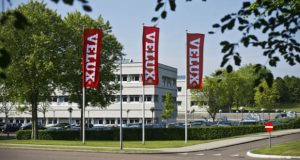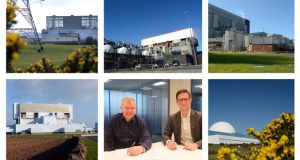Office fit-out specialist PSG Global has produced a guide to the coworking phenomenon and why more corporates than ever are requesting coworking spaces. Marina Vassilopoulos reports.
Coworking spaces are a relatively new phenomenon, with the first coworking space built in 2005. These spaces have increased in popularity due to their accessibility and the creation of WeWork. In 2022, Apple TV released a mini-series entitled ‘WeCrashed’, based on the tumultuous reality of Adam Neumann’s time as the CEO of WeWork. This series has once again transformed coworking spaces into a topical feature.
PSG Global is a prestigious international fit-out and relocation project management company based in London. The business has worked on several projects regarding coworking in the past, using extensive experience in transforming commercial spaces into vibrant hubs. The company has provided an informative guide on coworking, and, having worked on spaces to enable its corporate clients to attract individuals to spaces has charted the developments in coworking over the past few years.
In reality, only 40 per cent of coworking spaces have been profitable throughout their time in operation. These spaces are primarily located in major cities, with 1,423 coworking spaces accessible in London alone. These areas are best suited to users with a hybrid or self-employed model, often splitting their time between the office, coworking space, and even their home. Coworking spaces are known for offering a range of amenities that the traditional office fails to provide, with vibrant and aesthetically pleasing community spaces available to users.
COVID-19 AND COWORKING
The COVID-19 pandemic has acted as a catalyst for a dynamic shift in standard working models. The CIPD reported that in 2021, over 40 per cent of employers expected more than half of their employees to work from home regularly. The pre-pandemic figure? A mere five per cent. This increase marks a significant shift in working patterns, accompanied by a phenomenon known as The Great Resignation. Legions of workers are, for the first time, finding their voices heard regarding their needs.
While a pay increase was previously a sole target when applying for a new role, employers have found that potential applicants now desire several things. In addition to a pay increase, 61 per cent of employees want a greater work-life balance and better personal wellbeing. Forty-three per cent of applicants also desire COVID-19 policies that align with their personal beliefs, while 42 per cent desire a diverse and inclusive workspace. These figures suggest that individuals feel that they have higher standards when it comes to seeking a new role following the COVID-19 pandemic.
Some offices have adapted to provide a work-life balance while in the office. PSG Global worked on helping Hindawi Publishing Corporation with its expansion in 2019. The client requested a presentation area for clients and staff. PSG Global’s renovation of the 4,500 sq ft floor included a new breakout space with a tea point and benches, alongside a gaming area. Such a space enables staff to relax during their lunch break while enhancing interpersonal relationships, communication and bonding within a team.
THE NEW WORKPLACE
In recent years, it is evident that the workforce paradigm has shifted. So, what do people want in their new working lives, rather than the traditional office setting? The answer may be simple: coworking. According to a GCUC survey, 84 per cent of coworking individuals stated that working in such an environment allows them to be more engaged and motivated. As a result, architecture firms, such as PSG Global, are now billing more from reconstruction and renovation projects than new builds for the first time. This shift is due to soaring demand for office renovations.
Trends noted by the CBRE included more social and collaborative spaces when renovating offices. A recent CBRE survey of 185 office tenants found that 91 per cent of respondents plan to adapt their existing office space, with 52 per cent expecting to reduce their offices, while 39 per cent expect to expand. These renovated coworking spaces are often in old, beautiful buildings. For example, Montreal’s Crew Collective & Cafe occupies a former Royal Bank in Quebec. The NeueHouse Bradbury, located in a building described as a ‘historic masterpiece’, was built in 1893. The famous site has appeared in several films, television shows and music videos, including Blade Runner. Workers can live out their science fiction dreams, working in a building that checks the historical boxes.
What do people want within these new office spaces? Freedom of choice. A coworking space offers free coffee, snacks, sit-to-stand desks, a community and exemption from the rigidity of the standard workday. Individuals are free to wear casual clothing or take breaks without reprimand. Studies have proven that a positive working environment can improve an employee’s efficiency, motivation and satisfaction. Coworking spaces are therefore beneficial for both employers and employees.
PSG Global recently worked on a coworking space in Uxbridge, West London. Jazz Networks became the first occupants of the newly refurbished Charter Building. The impressive Grade A building, spanning 241,000 sq ft, was previously the headquarters of Coca-Cola. Following the refurbishment, the site now boasts the largest office space in Uxbridge, with high ceilings that reach up to 3.4 metres and floorplans that span over an acre.
The space has been redesigned with users in mind, offering several exclusive features to individuals. There is an area dedicated to street food that spans over 100 metres. There are also break-out areas, coffee shops, and a concierge service within the coworking space.
PSG aided in designing, fitting out and providing the office furniture that was utilised in the area. In only six weeks on-site, the area was transformed to include workstations for technology staff. The result is an ultra-light, modern, aesthetically pleasing zone in which the workforce of several companies can eat, work collaboratively, and socialise.






